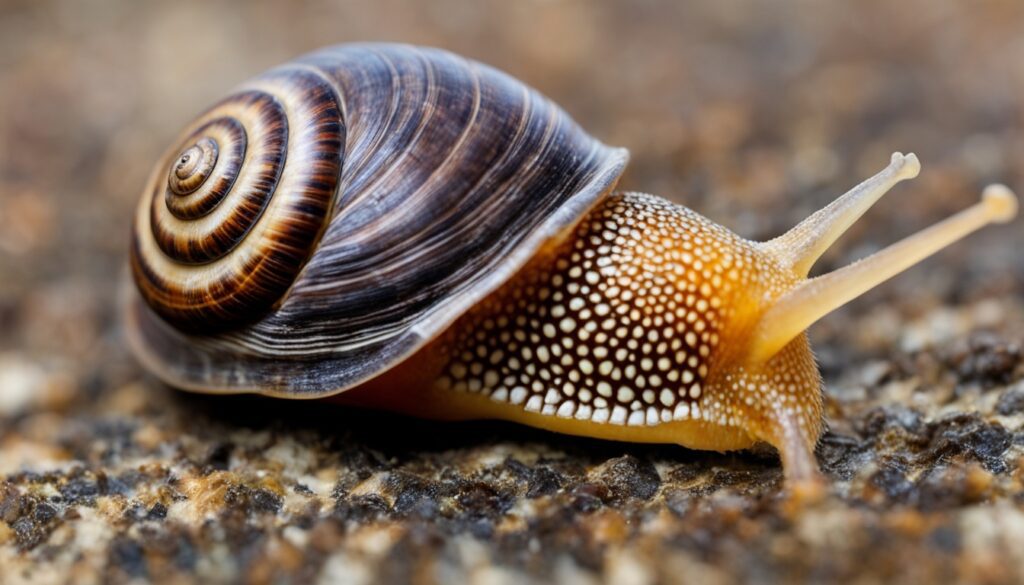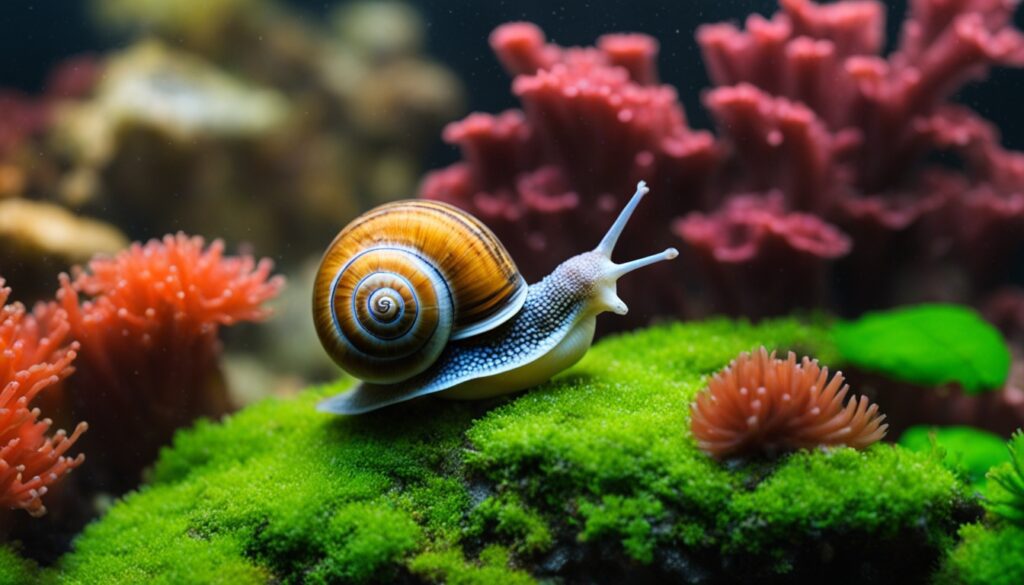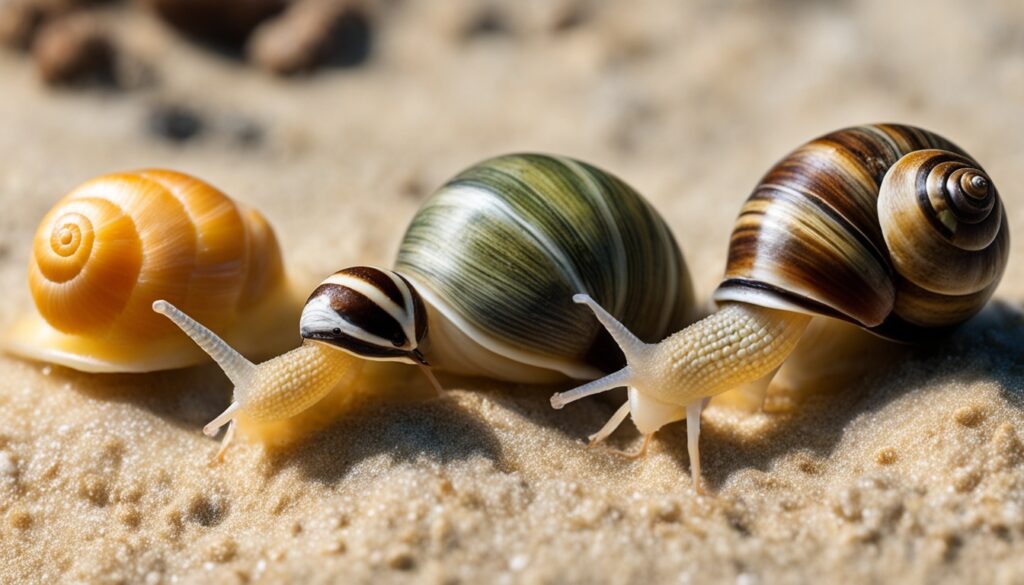Welcome to the world of turbo snails, the unsung heroes of a clean and healthy marine aquarium! These little guys come from the warm waters off the coast of Mexico, and they’re not just adorable—they’re also crucial for maintaining balance in a saltwater tank. In this guide, we’ll cover the essentials of turbo snail care, from their lifespan and size to choosing the best tank mates. Let’s get started!
Thinking of adding turbo snails to your tank? You’ll need a tank of at least 30 gallons to give them a good home. These snails can live for 1 to 2 years and grow up to 2 inches, which is big for your tank. They like a temperature of 72°F to 80°F and a pH level of 8 to 8.4, making them flexible for most saltwater tanks.
For turbo snails, the right water conditions are crucial. They need a specific gravity of 1.020 to 1.024 to keep their shells healthy. Since they eat algae, they do well in tanks with plenty of algae. When looking for turbo snails for sale, remember they are collected in Mexico during the summer break due to the heat.
Choosing the right tank mates for turbo snails is important. They are calm, so avoid putting them with aggressive invertebrates. The right mix of tank mates will help them live peacefully, especially if you have Tangs that also eat algae.
When I started with my saltwater aquarium, adding turbo snails was a game-changer. They kept my tank clean and added beauty. With the right care, some turbo snails can live up to 7 years, growing as big as golf balls. With patience and the right care, your turbo snail can be a long-term friend in your tank. Let’s explore the best conditions and tank mates for your turbo snails together.
Introduction to Turbo Snail (Turbo fluctuosa)

Turbo fluctuosa, also known as the Turbo Snail, is a key part of marine aquarium balance. They are known for eating algae. These snails come from the Gulf of California’s rich waters. They are calm and fit well in community tanks.
Identifying turbo snails is easy because of their unique shell colors and size. They grow to be 2 to 3 inches big. They are important for controlling algae in tanks because they eat algae and seaweed.
Turbo snail compatibility with other tank friends is great because they are peaceful. They live well with most fish and invertebrates, unless those are aggressive or like to eat snails. Keeping the right conditions for these snails helps the tank stay healthy and clean.
For Turbo Snails to do well, they need certain water conditions. They like water that’s 70°F to 73°F and has a salinity of 1.023 to 1.025. They also need calcium levels of 350 to 450 ppm to keep their shells strong.
Parameter |
Optimal Range |
|---|---|
Size |
Up to 2 inches, occasionally 3 inches |
Tank Size |
Minimum 10 gallons |
Lifespan |
1.5 years in captivity, up to 3-5 years in the wild |
Water Temperature |
70°F – 73°F |
pH Level |
8.1 – 8.4 |
Calcium Levels |
350 – 450 ppm |
In conclusion, the Turbo Snail is a great choice for almost any saltwater tank, especially for those fighting algae. They are peaceful and get along with many tank mates. This makes them a top pick for keeping a marine tank balanced and clean.
Turbo Snail Size and Growth Potential

Exploring the world of turbo snails shows us their growth potential. These aquarium invertebrate profiles usually grow from 1 to 2 inches wide. They come in various colors and patterns, adding beauty to tanks.
Watching these snails move and eat is magical. They add beauty and help keep the tank clean by eating algae. This makes them a great choice for aquariums.
Knowing about turbo snail sizes helps pick the right ones for your tank. For example, the Mexican Turbo Snail can grow up to 2 inches wide. This means you might need to move some tank items as it grows.
To keep your snails happy, make sure to secure corals and other delicate items. Also, give them enough space to move around. This way, you can manage their growth and keep your aquarium peaceful.
- Maximum size for Turbo/Astrea Snail: 2 inches diameter.
- Typical color variations include pale shades and striped patterns.
- Essential role in algae control, enhancing tank cleanliness.
This look into turbo snail sizes and growth shows the need for careful planning. By planning ahead, you can create a great home for these helpful snails.
Essential Water Requirements and Parameters

When I first started with marine aquariums, I was drawn to the vibrant Turbo Snails. They are great at cleaning algae. It’s important to keep their water just right for them to live and thrive.
Introducing Turbo Snails to Your Aquarium
Starting with turbo snail care means introducing them correctly. Make sure your water’s specific gravity is between 1.020 and 1.024. This matches the ocean’s conditions. Turbo Snails don’t like sudden changes in water chemistry. So, use a drip-acclimation method when adding them to your tank. Keep the temperature steady, between 72°F and 80°F, for their comfort.
Maintaining Ideal Water Conditions for Health and Longevity
Once your snails settle, focus on keeping the water right. Test the pH often to keep it between 8 and 8.4. It’s also important to keep nitrates low and avoid copper-based meds, as they can harm Turbo Snails.
Regular checks and water changes help avoid problems. They also keep your Turbo Snails healthy. Plus, they need space to move and hide, just like in the wild. This helps them stay happy and healthy.
Keeping your aquarium balanced is key. It helps your Turbo Snails and all other sea creatures live together well.
Species |
Max Size |
Recommended Tank Ratio |
Other Requirements |
|---|---|---|---|
Turbo Snail |
2 inches |
1 per 50 liters/11 gallons |
Requires ample algae, avoid copper |
Blue Leg Hermit Crab |
1 inch |
No specific ratio |
Easy care level |
Lettuce Nudibranch |
3 inches |
Special dietary needs |
Moderate care level |
1 inch |
No specific ratio |
Easy care level |
Caring for Turbo Snails is rewarding. They add beauty and help keep your aquarium clean. With the right water requirements and specific gravity, they’ll do great under your care.
Understanding the Lifespan of a Turbo Snail

Exploring the world of saltwater aquarium inhabitants, the turbo snail lifespan is quite interesting. These creatures usually live from 1 to 2 years. But, some can live longer, adding to the beauty of long-term aquarium setups. I was amazed by a story from Los Angeles, California, where a turbo snail lived over 13 years. This shows how these snails can thrive under the right conditions.
Every day, turbo snails play a key role in keeping their tanks clean by eating algae. They are easy to care for, making them perfect for both new and experienced aquarium owners. Let’s dive into their life expectancy and what affects their long life:
Location |
Member Insight |
Snail Lifespan |
|---|---|---|
Toronto, Canada |
Large turbo snails maintained for 2 years |
2+ years |
Los Angeles, California |
Successfully nurtured a turbo snail for over 13 years |
13 years |
Bradenton, Florida |
Kept a turbo snail since 2005 |
18 years |
Richmond, Virginia |
Regular intervention to upright fallen snails |
Varies |
Placing my turbo snail in the center of my saltwater aquarium is key. It’s important to add algae supplements and keep the water stable. This helps them eat well and live longer. Taking good care of the tank helps these snails thrive, making them a key part of long-term aquarium setups.
Choosing Compatible Tank Mates for Your Turbo Snail
Adding a Turbo Snail to your marine aquarium is more than just giving it a home. It’s about building a community where everyone gets along. To make sure your Turbo Snail thrives, pick tank mates that are peaceful and like to keep the tank clean. These snails are known for eating algae, so they fit well with other calm species.
The Peaceful Coexistence of Turbo Snails and Other Species
It’s important to match your Turbo Snails with other calm saltwater creatures that won’t eat them. The Blue Leg Hermit Crabs and Scarlet Reef Hermit Crabs are great choices because they also eat algae. Banded Coral Shrimps, Royal Grammas, and Pajama Cardinalfish are friendly too. They help keep the tank clean and balanced.
To learn more about creating a balanced tank, check out informative resources. They offer insights into snail behaviors and diets.
Species to Avoid: Predators and Aggressive Invertebrates
Not all marine creatures are good friends with Turbo Snails. It’s crucial to keep predators and aggressive animals away from them. Predatory fish or certain crabs might harm or stress out your snails. So, picking the right tank mates is key to your snail’s health and happiness.








